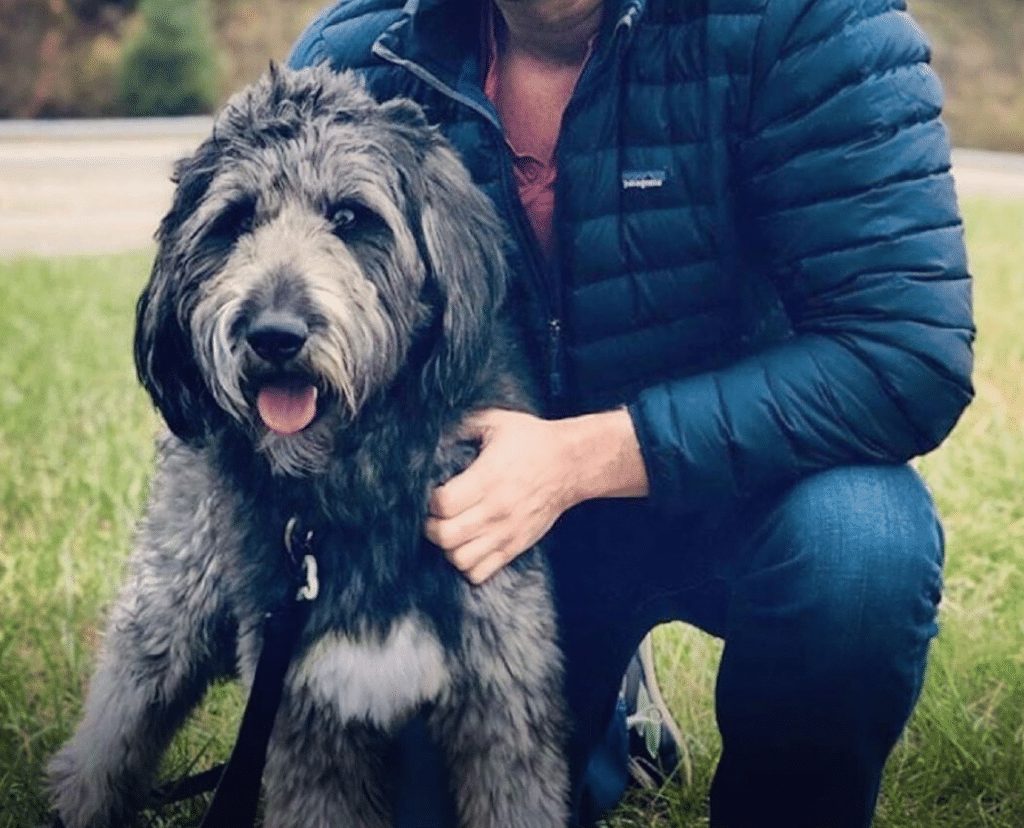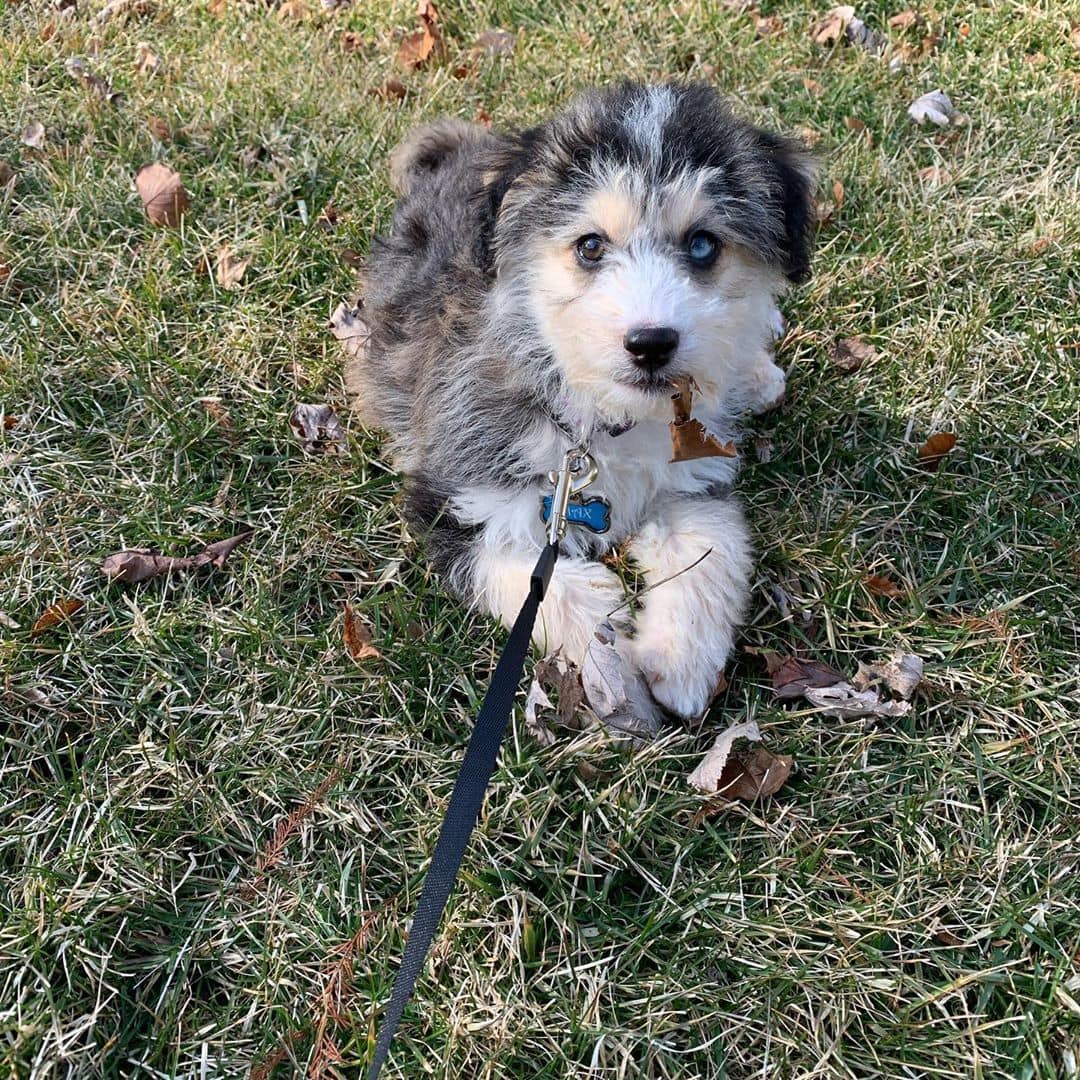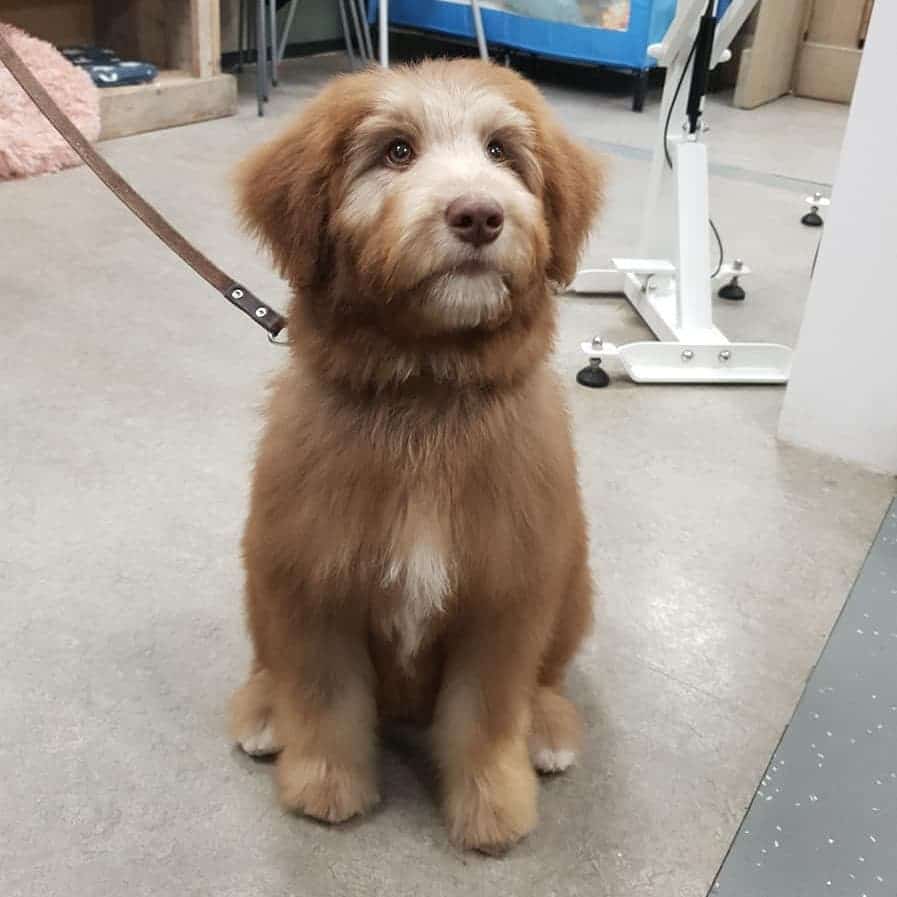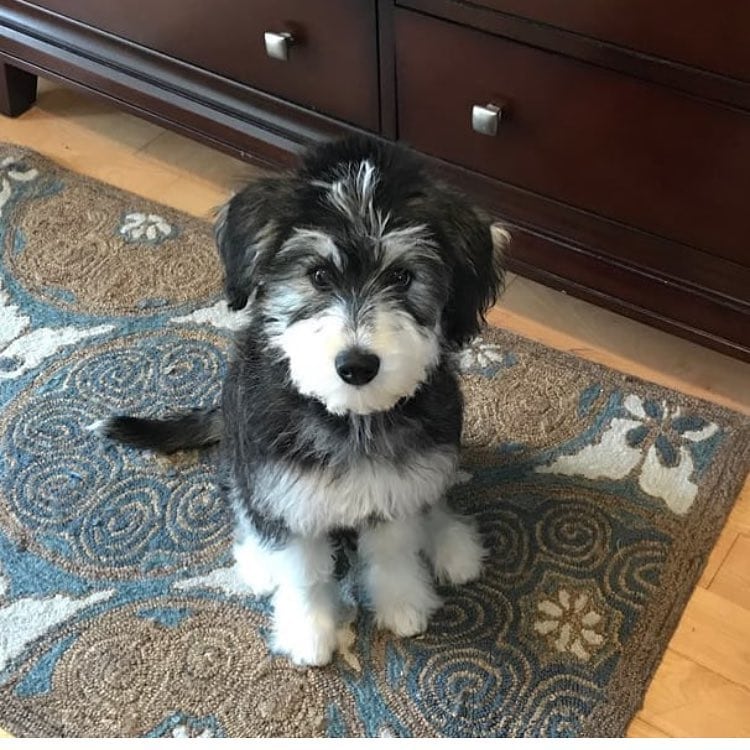
Fluffy, intelligent, strong, energetic, easily trainable, hypoallergenic, non shedding and loyal – what more could anyone ask for in a dog?! The Huskydoodle is a breed of dog with all of these traits and has started to become an increasingly popular doodle trend – right behind the Goldendoodle and Labradoodle.
Huskydoodles are an eclectic mix of two very different types of dogs. First, the Siberian Husky is a big dog bred for working in the coldest climates. Second, the designer Poodle, a cute and intelligent pooch known for its designer looks, hypoallergenic, and non shedding features. This makes for a unique combination that many dog owners have come to know and love.
The Huskydoodle is a relatively new breed of dog, and if you are considering purchasing or adopting one, then it is crucial to make sure that you can take care of both the Poodle and Husky traits of the dog. Your dog will have varying levels of traits from both of his parents, and a strong working dog with a high level of intelligence can be a handful!
What Is A Huskydoodle?
A Huskydoodle is a breed of dog with many nicknames – Siberpoo, Huskypoo, Poosky and Huskapoo, to name a few! A lot of cute names for a cute breed of dog, but they all boil down to one type of dog. A Siberian Husky crossed with a Poodle.
At a glance, the Husky and Poodle aren’t an obvious choice to cross-breed, but since the Siberian Husky sheds a lot of fur, crossbreeding it with a Poodle makes puppies more hypoallergenic and minimally shedding. However, they do look like completely different dogs and were originally bred for very different purposes. Still, the results of this cross-breeding has created a designer dog with a lot of personality and some really great features!
A Short Huskydoodle History
The Huskydoodle is a relatively new breed of dog, and it isn’t well known exactly how and when this cross-breeding occurred… or why. However, we do know a lot about the individual breeds that make up this new type of pooch.
The Siberian Husky
The Husky we know and love originally came from northeastern Asia and were first seen in a semi-nomadic tribe – The Chukchi People.
These dogs, with their thick coats and high endurance levels, made the perfect sledging dogs that when tethered together as a pack can easily pull light sledges and loads across some of the harshest of cold areas. These ancestors of today’s Siberian Huskies were isolated from other dog breeds and people, and thus maintained their pure breed for generations before making their way to the rest of the world and slowly becoming the Siberian Husky we know of today.
The Siberian Husky isn’t just a working dog; they make wonderful companion pets, albeit with a lot of energy! They tend to have a friendly nature that us humans love in our pets. However, they do shed tons of fur which is why it makes sense to crossbreed with a Poodle!
The Poodle
The Poodle might be known as a French dog but the breed actually originated in Germany. The breed is known for its water-resistant coat that made it perfect for duck hunting which then gave way for it to be an excellent water retriever dog. Fabulous swimmers with a great deal of intelligence, these dogs make fantastic pets and have now been bred into many varieties including toy breed versions and in many colors. One of the main draws to the Poodle is that the breed has a non-shedding, hypoallergenic fur coat. So if you don’t want to vacuum up fur every day or get fur on your clothes, doodle breeds are a great choice.
The Huskydoodle Breed
There are never any guarantees when it comes to cross-breeding dogs, and each dog will have its own variation of coat colors, markings, temperament, and traits. That means all Huskydoodles will have slightly different personalities and looks. Of course, that’s part of what makes them so adorable! Each dog has his own unique character and flair. For more information about doodle generations and characteristics, read our Goldendoodle Generation Guide.
Huskydoodle Physical Traits
There are some common traits to look out for that many Huskydoodles will share. They often are a mix of a highly alert dog with high intelligence and a lot of energy! These are dogs that will need a lot of walking and attention to stop them from becoming bored. If you can provide a dog with an active lifestyle and lots of mental stimulation, the Huskydoodle might be the perfect dog for you.
The appearance of a Huskydoodle can vary and it highly depends on its parents and their heritage. They commonly have thick double layers of hair, giving them a fluffy, shaggy appearance. The more Poodle genetics a Huskydoodle has the more curly, non shedding, and hypoallergenic the dog will be. The coat color can vary hugely depending on its heritage. They tend to stand between 13 to 22 inches high with a weight of between 45 to 60 pounds making this a medium to large dog. Sometimes a Huskydoodle has the distinctive bright blue eyes of their Siberian Husky ancestors, but they are just as likely to have the intelligent eyes of a Poodle.
Huskydoodle Temperament
The Siberpoo has a good temperament that makes for the perfect pet. Affectionate and smart, they are easily trainable and generally love to please their pet parents. In addition, a Huskypoo enjoys the company of humans and tend to be good with strangers too. However, it isn’t all easy and perfect genetic traits. This breed of dog can be a bit of a handful at times. They have a lot of energy and can be mischievous with it too.
Huskypoos can be quite stubborn at times, and they can have destructive behavior if not given an adequate amount of exercise. In addition, since this is an extremely smart dog breed, they can sometimes be unruly and difficult to handle. Luckily, they tend not to be aggressive. Keep in mind, though, that any dog, no matter how docile, can become aggressive and difficult if their needs are not met.
These dogs can make excellent family pets for those with older children. They don’t like being poked or prodded too much, which could be difficult for families with infants and small children. For families who love hikes and plenty of outdoor activities, this dog is perfect and easily trainable and with boundless energy.
Huskydoodle Health and Care
Luckily, both the Siberian Husky and the Poodle are generally healthy dogs, great news for owners of the designer dogs. Choosing a good breeder will help allay any health fears you have. A great breeder should know and be able to tell you the history of the parents and the lineage of your dog – this includes any potential for health problems.
As with any breed of dog, there are some health issues that a Huskydoodle cross-breed may inherit from its parents breed such as:
- Allergies
- Patellar luxation
- Elbow and hip displacement
- Separation anxiety
Your breeder and vet can give you advice on these and any other issues your Huskydoodle may suffer with. If you own or are planning to own one of these beautiful dogs then regular vet checkups, a healthy lifestyle, and plenty of exercise should keep many health issues at bay and your Poosky should have an average lifespan of 10 to 14 years.
A Huskydoodle is a fairly easy dog to take care of as long as you have the time! They need a least an hour-long walk daily to make sure they get enough exercise. Your dog will also need you to be around a lot to give them both mental stimulation and companionship. These are companion dogs and won’t thrive if left alone for too long.
When it comes to general maintenance and coat care, bear in mind that this dog is bred from two dog breeds that require a lot of grooming! Luckily, the mix of the long, fluffy Siberian Husky coat and short wiry Poodle hair has toned down the need for grooming a little bit. However, you will regularly need to brush a Poosky and give them haircuts.
You shouldn’t need to shave your dog’s hair like you would a Poodle or give it regular trims like a Husky, but their longer coats and wavy hair can get matted easily so regular brushing is a must to avoid shaving your dog. As with anything that is a cross-breed, the traits your dog inherits will be hit or miss. If your dog’s coat is more like a Husky, you will have to groom him less frequently but they will shed. If your dog is more like a Poodle, you will need to give his coat a little more grooming and care. However, he will shed less.
Is A Huskydoodle The Right Dog For Me?
There is no doubt about it: Huskydoodles are lovely dogs. Their mix of affection, intelligence, character and energy all wrapped up in a fluffy coat of fur makes them a wonderful pet and companion for families with older children or for those with a lot of time to devote to their dog — especially for families who like to exercise!
If you aren’t too worried about having a perfect purebred, and you’re happy to accept whatever mix of characteristics and traits a crossbreed dog comes with, then the Huskydoodle is perfect. It can be a bit of a lottery to see what traits of its parents are most dominant, but both Siberian Huskies and Poodles are great dogs, and bred together they create beautiful balls of mischievous Huskydoodle energy! They also tend to shed a lot less fur and are more hypoallergenic due to their Poodle genes.
If you don’t have a lot of time to exercise a dog or would be leaving your pet alone for long periods of time then this is not the dog for you. Huskypoos needs a lot of exercise – at least sixty minutes every single day! They also require a lot of mental stimulation to keep from getting bored and getting into mischief!
Huskypoos are fairly easy to maintain but will require some grooming and bathing, especially if your pooch has decided to follow its poodle ancestors and go for a swim! Usually, regular brushing is enough and most of us can fit this into our lives easily.
So, if you are looking for a bundle of energy with a loyal, affectionate nature, and are able to cope with the energetic and intelligent nature of these types of dogs then the Huskydoodle is the dog for you!
Frequently Asked Questions
Are Husky Poos good with kids?
A trained Husky Poo is very good with older children who can be told how to act around the dog and understand its boundaries. This dog is a watchdog and therefore are often more aggressive than other dogs, making them not the best for younger children.
This is because younger children don’t have the mental capacity to retain information on how to act around a dog. While a Husky Poo is not considered a dangerous dog, they can become assertive if something is annoying them or seen as a threat.
While many Husky Poos might be excellent with young children, it only takes one situation for your child to upset your dog and get them on high alert. This could lead to a dangerous situation.
So, if you want to introduce a Husky Poo to kids, make sure that the children are old enough to understand and respect the dog’s boundaries.
The Husky Poo is quite an independent dog that won’t want to be jumped on and disturbed all of the time, so bear this in mind when mixing them with children.
Are Huskydoodle hypoallergenic?
Yes, Husky Poodles are hypoallergenic and therefore excellent dogs for people with mild allergies to dog hair. Their coats are double layered and therefore require grooming sessions on a regular basis.
If the dog has taken after its Poodle parent in terms of its coat, you won’t have to deal with as much shedding as if they have taken after their Husky parent. Husky Poos that shed more won’t be as good for allergy sufferers, so bear this in mind before opting for this dog.
Huskydoodles often don’t carry smells in their fur, either. This is a desirable feature of the dog as they won’t smell often and therefore don’t need washing too often. You will need to bathe them around once every month or every two months.
You might prefer to take your Husky Poo to the groomer instead of trying to look after their coat yourself. This is because their coats can be very difficult to manage, with different hair types over different parts of their bodies.
This can leave the grooming session running much longer than it should do. Instead of wasting your time on a subpar grooming job, take them to a groomer so that they can be properly taken care of without pain or discomfort. Both your hands and wrists will thank you!
Do Husky Poos shed?
Husky Poos are often bred to create a dog that looks like the Husky with the low-shedding coat of a Poodle. However, every dog that comes from this breeding session will be on a spectrum concerning their coat types.
For example, one puppy might have a coat that resembles their Poodle lineage, while another might have a coat that resembles a Husky much more.
As Huskies are shedding dogs, if your Husky Poo has a similar coat type to their Husky parent, they will shed hair. However, on the other hand, if the puppy has a similar coat type to their Poodle parent, they won’t shed nearly as much hair.
Unfortunately, there is very little that you can do to determine the hair type of your Husky Poo – especially if you are purchasing them from a trusted breeder. You will typically only be able to tell what type of coat they have once they reach a mature age, which can take months.
This breed of dog with a Husky-esque coat will not typically be as allergy-friendly as dogs with a coat resembling a Poodle, so this is something to consider before opting for a Husky Poo if you have allergies.
Are Husky Poos good dogs?
Of course! Husky Poos are excellent dogs that are incredibly intelligent, sociable, active, and loyal. They have taken the best parts of Poodles and Siberian Huskies and rolled them into the Husky Poo breed, offering their owners the best of both worlds.
The Huskydoodle is a great dog for active people who enjoy getting outdoors and exercising. This is because the Husky Poo requires quite a lot of exercise, so they might not be the best for families who are too busy to take an hour of their day for a dog walk.
Husky Poos also make for good watchdogs and can be quite assertive when they feel like they are in danger, or there is a threat near their loved ones or belongings. This does not mean that they are aggressive; however – they are simply fiercely loyal to their family.
Their loyalty might come from the pack mentality of Huskies. As Siberian Huskies are a distant relative of wolves, they tend to have a pack mentality. So, your Husky Poo could also have this mentality.
As they are not in the wild, you and your family will become your Huskydoodle’s pack. Therefore they will protect you, and expect you to do the same.
Are Husky Poos hard to train?
No, Husky Poos should not be difficult to train. They are highly intelligent dogs that will listen to their owners. However, it is also true that they are stubborn at times and difficult to manage if you haven’t established that you are the boss of the house.
Ensuring that you are always firm and patient with your Husky Poo can help them to know that they should be listening to you as you train them.
You can also help the training process along by offering them lots of treats and positive words when they get something right. This will make training more effective so that you don’t have to continue the training process for too long that they get bored.
Husky Poos should always be socialized as soon as they are born, and training should also begin soon after to prevent missing the best window of opportunity. Young and immature dogs are the most impressionable, so you should begin training them as soon as you get them home and settled.
Conclusion for the Huskydoodle Guide
A Huskydoodle is the best of both worlds: a non shedding and hypoallergenic Husky. Many people love the high energy, loyalness, and love of a Husky, but hate vacuuming up a constant amount of hair. The Huskydoodle has many different nicknames like the Siberpoo, Huskypoo, Poosky and Huskapoo. This is an extremely fast growing and trending doodle breed.
Check out our other articles:
- Best Double Door Dog Crates
- Best Horns for Dogs to Chew On
- Best Dog Pull Harness
- Best Onesie for Dogs
Garrett loves animals and is a huge advocate for all Doodle dog breeds. He owns his own Goldendoodle named Kona. In addition, he volunteers at the Humane Society of Silicon Valley, where he fosters dogs and helps animals. Garrett enjoys writing about Doodles and believes that dogs can teach humans more about how to live than humans can teach a dog.
Why Trust We Love Doodles?
At We Love Doodles, we’re a team of writers, veterinarians, and puppy trainers that love dogs. Our team of qualified experts researches and provides reliable information on a wide range of dog topics. Our reviews are based on customer feedback, hands-on testing, and in-depth analysis. We are fully transparent and honest to our community of dog owners and future owners.


